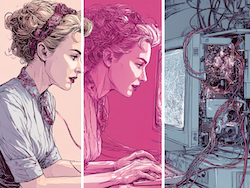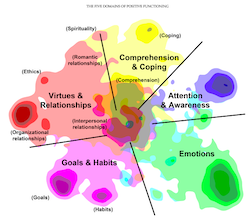Pulling from Constellation's Offload principle, a personal take on unlearning perfectionism by letting AI carry pieces of your cognitive burden.
I spent most of my twenties convinced that asking for help was a character flaw. Not just asking humans for help—though that was hard enough—but using any external tool that made my life easier. Taking notes during meetings? Surely I should be able to remember everything. Using a calculator for math? A crutch. Setting phone reminders for important tasks? Proof that I couldn't manage my own life.
The peak of this absurdity came when I was working on my first book, Can You Learn to Be Lucky?, when I initially refused to use citation management software because I thought manually formatting hundreds of references would somehow make me a better scholar. Spoiler alert: it didn't. It just made me exhausted and resentful of every source I had to cite.
It took years of therapy, a neurodivergent diagnosis, and eventually studying frameworks for my brain to realize that I'd been confusing self-reliance with self-sabotage.
The Perfectionism Trap
Here's what nobody tells you about being a recovering perfectionist with ADHD: your brain is simultaneously excellent at big-picture thinking and terrible at remembering where you put your keys. You can solve complex problems but forget to eat lunch. You can write brilliant analyses but can't remember if you already sent that email or just thought about sending it really hard.
For years, I treated these contradictions as personal failings. If I was smart enough to [insert intellectual task here], why couldn't I manage basic life administration? If I could hold space for complex ideas, why did simple task management feel impossible?
The answer, I eventually learned, wasn't that I needed to try harder. It was that I needed to try differently.
Meeting the Offload Principle
When I first encountered Constellation's concept of offloading—the idea that externalizing cognitive tasks isn't weakness but strategy—it felt like someone had given me permission to stop hitting myself with a hammer.
The principle is beautifully simple: your brain has finite cognitive resources, and the goal isn't to maximize how much you can hold in your head simultaneously. The goal is to optimize how you use your mental energy by delegating routine cognitive tasks to external systems so you can focus on what requires your unique human judgment and creativity.
In other words: why memorize your grocery list when you could write it down and use that mental space for something more interesting?
The AI Integration Experiment
This mindset shift coincided perfectly with AI tools becoming actually useful for daily life. Suddenly, I had access to systems that could handle not just simple reminders and lists, but complex cognitive tasks that used to drain my mental battery.
I started small. Instead of trying to hold entire email conversations in my head while crafting responses, I began asking ChatGPT to help me organize my thoughts: "I need to respond to this email about project timelines, but I'm feeling overwhelmed by all the moving pieces. Can you help me structure my response?"
The AI wouldn't write the email for me—I'm not trying to outsource my personality—but it would help me untangle my thoughts and organize them logically. It was like having a thinking partner who never got impatient with my need to process things externally.
Cognitive Load Distribution
The real breakthrough came when I realized I could distribute cognitive load across multiple systems in a way that played to each system's strengths. My brain is excellent at creative problem-solving, pattern recognition, and understanding nuance. AI is excellent at organizing information, catching details I might miss, and processing large amounts of text quickly.
Instead of trying to hold everything in my head or do everything myself, I could create a hybrid system where each component handled what it was best at.
Planning a complex project? I'd dump all my thoughts into a document, then ask Claude to help me identify themes, spot potential conflicts, and suggest a logical sequence. The AI couldn't make strategic decisions for me, but it could organize the information in a way that made those decisions clearer.
Writing a difficult email? I'd draft my raw thoughts, then ask for help structuring them in a way that communicated my actual intent instead of my emotional reaction.
Managing competing priorities? AI could help me map out the real trade-offs and dependencies so I could make informed choices instead of just reacting to whatever felt most urgent.
The Shame Spiral Solution
One unexpected benefit of this approach was how it helped with shame spirals. You know the ones: you forget something important, feel terrible about forgetting, spend mental energy berating yourself for forgetting, then forget something else because you're distracted by feeling bad about the first thing.
When external systems are handling routine cognitive tasks, there's less opportunity for that particular flavor of self-attack. I can't forget to follow up on that email if I've asked Claude to remind me about it tomorrow. I can't lose track of project deadlines if they're being monitored by systems designed for that purpose.
The shame spiral gets interrupted because the failure points that used to trigger it simply happen less often.
What Offloading Actually Looks Like
Let me be concrete about what this looks like in practice, because "cognitive offloading" can sound abstract or intimidating.
Email management: Instead of rereading the same email five times trying to remember what it said, I paste it into Claude with a question: "What are the key action items here, and what's the most important thing for me to respond to?"
Decision paralysis: When I'm stuck between options, I ask AI to help me map out the real pros and cons instead of spinning in indecision. "I'm trying to decide between these three approaches to [project]. Can you help me think through the implications of each?"
Task prioritization: Rather than staring at an overwhelming to-do list, I ask for help organizing it: "Here's everything I need to do this week. Can you help me identify which items are time-sensitive versus important versus could wait if needed?"
Information processing: When I need to synthesize information from multiple sources, I let AI do the initial organization: "I've read these three articles about [topic]. Can you help me identify the common themes and major points of disagreement?"
Redefining Intelligence
The most liberating part of this whole process has been realizing that intelligence isn't about how much you can hold in your head—it's about how effectively you can solve problems. And problem-solving often requires knowing when to offload routine cognitive tasks so you can focus on the parts that require human judgment, creativity, and wisdom.
A novelist doesn't become less creative by using spell-check. A mathematician doesn't become less brilliant by using a calculator. A project manager doesn't become less capable by using scheduling software.
And I don't become less intelligent by letting AI handle the cognitive tasks that drain my mental energy without adding unique value.
The Neurodivergent Advantage
Here's something interesting: being neurodivergent actually makes me better at working with AI systems in this way. The same executive function challenges that make traditional productivity advice inadequate also make me more creative about finding alternative approaches.
Where neurotypical people might rely on natural working memory and organizational skills, I've had to become intentional about externalizing cognitive processes. This experimentation with different systems and approaches translates perfectly to AI collaboration.
I'm not trying to make my brain work like a neurotypical brain. I'm trying to create systems that work with my actual brain, in all its scattered, creative, occasionally brilliant glory.
The Permission You Don't Need But I'm Giving Anyway
If you're reading this and recognizing yourself in the perfectionist-who-makes-everything-harder-than-it-needs-to-be category, here's your permission slip: using tools to make your life easier doesn't make you weak or lazy or less capable.
It makes you strategic.
Your worth isn't determined by how much cognitive load you can carry simultaneously. Your intelligence isn't measured by your ability to remember things that could easily be written down. Your value doesn't depend on doing everything the hard way just to prove you can.
The goal isn't to become someone who never needs external systems. The goal is to become someone who uses external systems strategically to free up mental energy for the things that actually matter—the creative work, the relationship building, the problem-solving that requires your unique human perspective.
Start Small, Think Big
You don't have to revolutionize your entire system overnight. Start with one cognitive task that consistently drains your energy without adding much value. Maybe it's organizing your thoughts before important conversations. Maybe it's keeping track of project details. Maybe it's processing complex information from multiple sources.
Pick one thing and experiment with offloading it. See how it feels to use that mental energy for something more interesting instead.
Because here's what I've learned: the goal isn't to become superhuman. The goal is to become more fully human by freeing yourself from the cognitive tasks that don't require your humanity.
What cognitive burden are you ready to put down? The tools are there when you're ready to use them.
Stay Informed and Inspired
Join our community of forward-thinkers and gain insights into AI communication and storytelling. Subscribe to our newsletter for the latest updates and exclusive resources.






